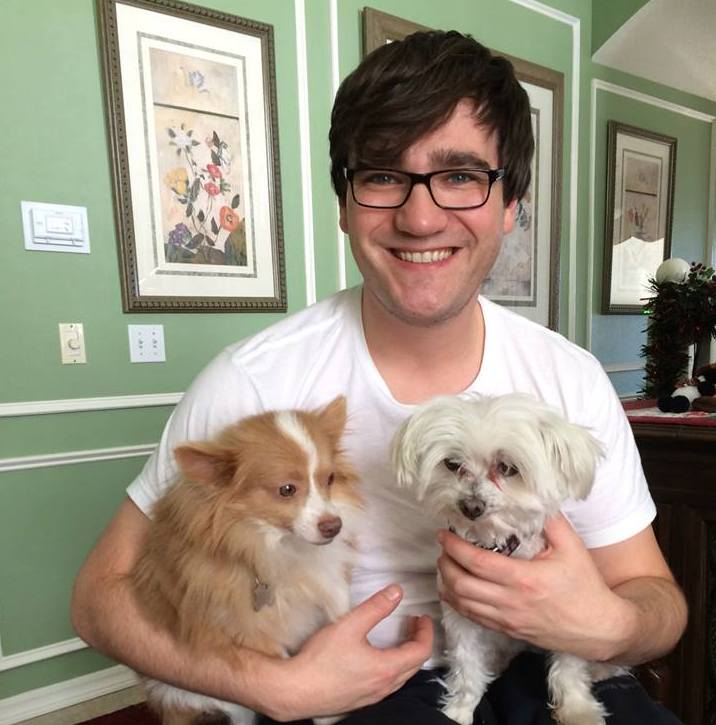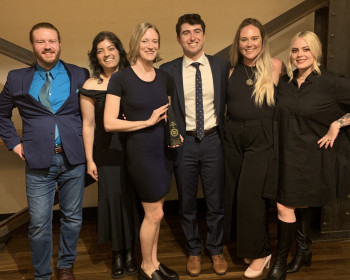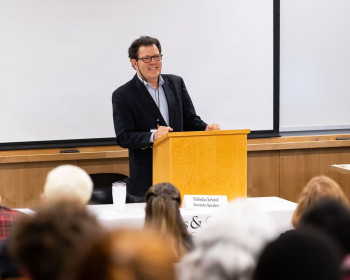Snapshot of an Almost JD: Dylan Trosper
Open gallery

“I met Dylan last year on a whim on the stairs of Wood Hall. I had a feeling he would become a great friend. Luckily, I got to know Dylan better this year because of Erin Ryan’s Negotiations class. As most people can tell you, Dylan is a pleasure to be around. He is smart, friendly, and a fantastic negotiator. He knows how to interact with a variety of people and can make almost anyone smile.”
-Halah
I asked Dylan the following questions. Here are his answers:
What’s your educational background?
I graduated from Corvallis High School in 1999. After a couple of terms at OSU, I didn’t make it back to school until 2006. In between, I worked as a mason and tile setter, eventually contracting independently as a sole proprietorship. My academic education before L&C Law was a History degree from Portland State.
What about your family background?
My mom raised me by herself, so I only knew her side of the family. Luckily, they are more than enough family for any one person! My great-grandpa came West from Kansas towards the end of the Dust Bowl. He was a cowboy, and did crazy stuff like catch rattlesnakes barehanded. My grandpa was almost as grizzled as his dad, and he founded the masonry company that my family still operates. My grandma did a lot of help raising me, and so did all of my aunts and uncles. Luckily, I was born in Portland, so I’m considered city-folk by most of my kin.
My family taught me to always treat people with respect, animals with love, and yourself with humbleness.
Why did you decide to go to law school?
Becoming a lawyer has been a dream of mine since the first grade. I saw it as a means of preventing the law from being controlled by an oligarchy, and ensuring that ordinary people are not disenfranchised from justice. By the time I became an adult, I also had more selfish motives - I wanted to challenge myself to do and to be more. Becoming an attorney is a lifelong goal; but, it’s also a process of growth.
The main thing that has kept me in law school (which might be a tougher question…) is seeing that there are gaps in the justice system, and realizing how my training now enables me to complete those gaps.
What is your favorite part about Lewis & Clark?
The collaborative atmosphere among the students, and the approachability of the professors. From what I know about other law schools, we really shouldn’t take those things for granted. It’s also hard to beat Tryon Creek Park for a location.
What is your least favorite part about Lewis & Clark?
The parking situation. It ain’t easy being green.
What are your future job and career goals?
It’s really tough out there. I’m planning on practicing locally in our competitive market. So, I’ve tried to stay flexible and explore lots of options. During school, I’ve focused on a diverse range of practical issues that I’ve seen commonly arise in people’s everyday lives. I hope to offer a practice that integrates business, family, tax, and civil law. Even as the law school tuition bubble bursts and the big firm business model collapses, the demand for professional legal help is as great as ever. As more and more modern lawyers can’t land traditional jobs, lawyers will have to be willing to step up and serve that need in less conventional manners.
What do you think prospective students should know before choosing to attend law school?
Thoroughly consider your options first. Your schooling is a huge financial and personal investment, and the market for lawyers is undergoing a massive reorganization. In other words, it’s risky to invest in law school right now - and good lawyers are supposed to be risk-averse. My main advice would be to talk to lots of attorneys, who are practicing in areas that you are interested in. Try to develop a clear picture of where you think your place will be in the legal profession.
What is an interesting part about your background? Or in other words, how do you contribute to the diversity of Lewis & Clark?
I’m a bit older than the average law student, and my family has historically been very poor and uneducated, so I guess I contribute to our diversity in those respects. It seems that Americans tend to think of diversity in terms of ethnicity or race. Portland is notoriously under-represented in those respects, but I believe that we do have a lot of diversity in terms of offering alternatives to mainstream perspectives.
Law Communications is located in room 304 of Legal Research Center (LRC) on the law Campus.
MSC: 51
email jasbury@lclark.edu
voice 503-768-6605
Cell: 626-676-7923
Assistant Dean,
Communications and External Relations, Law School
Judy Asbury
Law Communications
Lewis & Clark Law School
10101 S. Terwilliger Boulevard MSC 51
Portland OR 97219

